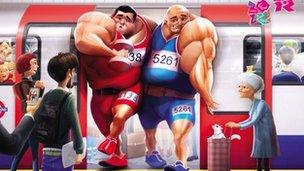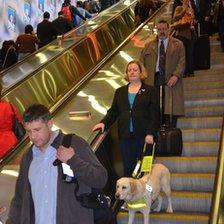Concerns over tackling Olympics overcrowding in London stations
- Published
"I won't be going out on my own because the travelling will be a nightmare," said Jamie Tse, 33, when asked about her plans for the Olympics.
Miss Tse, of Forest Hill, suffers from Multiple Sclerosis and relies on a crutch to get around. Her condition forced her to retire from the job of a research scientist at King's College London in 2007.
She will go to events at the Olympic Park in Stratford, Lord's Cricket Ground and Wembley Stadium, but other than that plans to steer clear of the crowds as it makes her "anxious".
She said: "Infrastructure per se is brilliant but since I am not in a wheelchair when I walk I get tired very easily, (and) my right leg drops so I lose my balance and trip over quite easily."
On Tuesday a "rehearsal" of what travel conditions will be like during the Games was marred when a train broke down at King's Cross Tube station and passengers were prevented from entering the station for 15 minutes to ease congestion.
Alex Turner, 41, a guide dog owner who works for the Metropolitan Police, said he plans to work from his home in Essex half the time to avoid overcrowded stations and trains.
His guide dog Westley finished training school only five weeks ago and will need time to cope with "new situations".
"With large crowds the guide dog will not be able to see as far ahead as possible to work out where we need to go, so there's more potential for getting lost or misdirected," he said.

Posters warning people about busy roads and trains during the Games have been put up across London
Transport for London (TfL) is expecting an extra three million journeys on the already packed transport network catering to 12 million passengers a day, as visitors are encouraged to use public transport.
And for disabled people the commute to work and the venues will require more effort and planning, charities warned.
A recent survey of Games venues by disability charity Transport for All and passenger watchdog London TravelWatch found that 13 of the 14 venues had step-free access and shuttle buses will be available for less mobile people.
Therefore accessibility was not an issue, but overcrowding was.
TfL said 66 stations have step-free access and there will be manual ramps at another 16. There will also be rapid response teams to repair lifts and 7,000 trained staff at travel "hotspots" to assist travellers.
Gareth Powell, London Underground's director of strategy said: "All Tube stations have staff trained to assist passengers, and every station on the DLR is step-free.
"Our bus fleet is the most accessible fleet in the world - with every one of our 8,500 buses low-floor wheelchair accessible and fitted with ramps which are checked daily to ensure they are working."
No earphones please
Guy Parckar, head of policy at Leonard Cheshire Disabilities, said for many people the Tube could be a "no-go area" over fears of congestion and they would rely on buses and "it was absolutely imperative that the bus network works effectively".
Both drivers and passengers need to help disabled people, for instance by making space for wheelchairs, he added.
Leonard Cheshire Disability, the Royal National Institute of Blind People and Transport for All advised disabled people to plan their journeys and let their disabilities be known to assistance staff.

Theresa Robberts said she does not mind travelling during the peak times
Lianna Etkind from Transport for All also urged TfL to publicise information disruptions offline as "certainly in Tower Hamlets, Newham and Waltham Forest local people feel that they have not seen offline information about how they will be affected."
Theresa Robberts, 37, of Shepherd's Bush, who is visually impaired, said dealing with the rush-hour on her way to work at the Guide Dogs charity in Euston will not be daunting for her and her guide dog Rikki.
She said: "If it's very full I do try and get a seat so that nobody steps on her feet or on her tail. Then I call her to 'come in tight' and what she does is curls in a ball as tight as she can and lies against my feet."
"I am going to the Paralympics several times as part of my work and I think your challenges would be very much what it normally would be, it might be just a little bit more amplified."
Accessibility legacy
But Miss Robberts asked commuters to watch out for disabled people.
"What would be absolutely brilliant is if they don't have their earphones on while walking or changing in the station.
"When they bump into me, Rikki thinks she's done something wrong. A lot of guide dog owners have learnt to make a stiff shoulder while walking so that if somebody does bump into you, you don't topple over," she added.
Mr Turner added: "A massive issue that assistance dog owners have is that the public seem to think they have a right to touch or call the dog.
"If someone distracts a guide dog, the dog is not focussing when it's walking and it can put the dog and the handler at risk of injury or worse."
Miss Tse said "inconsiderate behaviour" had put her off from tackling busy stations.
"One time when I was in London Bridge station some woman tripped me, kicked my crutch and nearly made me fall. She didn't even apologise and turned around and gave me a dirty look."
Charities said despite TfL's "concerted effort" there should be a "legacy of accessible transport".
TfL said seven more Tube stations will be step-free by 2018, but charities said the target was scaled back from 29% to 26% since 2008.
Transport for All want the manual ramps and the rapid response teams for lifts to remain while Leonard Cheshire is campaigning for London's gyms to be made accessible.
Ms Etkind said: "Once the last gold medal has gone out, disabled and older people will still need to get to education, work, friends and family, shops and healthcare."
- Published10 July 2012
- Published26 June 2012
- Published22 June 2012
- Published23 April 2012